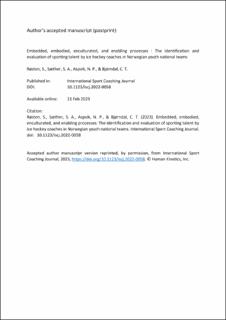| dc.contributor.author | Røsten, Stian | |
| dc.contributor.author | Sæther, Stig Arve | |
| dc.contributor.author | Aspvik, Nils Petter | |
| dc.contributor.author | Bjørndal, Christian Thue | |
| dc.date.accessioned | 2023-10-23T09:21:02Z | |
| dc.date.available | 2023-10-23T09:21:02Z | |
| dc.date.created | 2023-02-22T08:37:16Z | |
| dc.date.issued | 2023 | |
| dc.identifier.citation | Røsten, S., Sæther, S. A., Aspvik, N. P., & Bjørndal, C. T. (2023). Embedded, embodied, enculturated, and enabling processes: The identification and evaluation of sporting talent by ice hockey coaches in Norwegian youth national teams. International Sport Coaching Journal. doi: | en_US |
| dc.identifier.issn | 2328-9198 | |
| dc.identifier.uri | https://hdl.handle.net/11250/3098000 | |
| dc.description | Author's accepted version (postprint). | en_US |
| dc.description | This is an Accepted Manuscript of an article published by Human Kinetics in International Sport Coaching Journal on 21/2/23. | en_US |
| dc.description | Available online: https://doi.org/10.1123/iscj.2022-0058 | en_US |
| dc.description.abstract | Elite sports systems are characterized by structured attempts to identify, select, and develop talented athletes and to increase the likelihood that athletes will achieve future international success. Studies of such systems have focused mostly on the procedures and measures that are intended to improve talent identification, but less attention has been given to the crucial role of coaches. The aim of this case study is therefore to explore how coaches of Norwegian youth ice hockey national teams identify and evaluate sporting talent within these structured settings. The data were generated using nine semistructured interviews. These interviews included questions about how coaches identify talent and discussions about four hypothetical examples of ice hockey players, each with specific histories and skill sets. Building on recent developments in motor learning research, we contend that coaches identify and select talent using embodied (rather than entirely rational or cognitive) processes. These approaches are embedded in the ebb and flow of situated sports performances, and shaped by the broader and unique cultural settings in which they are situated. The results of this study show that talent identification and evaluation of sporting talent cannot, and should not, be separated from the subjectivities of the coaches themselves or from their individual preferences. The implications of this study for future research, policy, and practice are discussed. | en_US |
| dc.language.iso | eng | en_US |
| dc.publisher | Human Kinetics | en_US |
| dc.title | Embedded, embodied, enculturated, and enabling processes : The identification and evaluation of sporting talent by ice hockey coaches in Norwegian youth national teams | en_US |
| dc.type | Peer reviewed | en_US |
| dc.type | Journal article | en_US |
| dc.description.version | acceptedVersion | en_US |
| dc.rights.holder | © 2023 Human Kinetics, Inc | en_US |
| dc.source.pagenumber | 11 | en_US |
| dc.source.journal | International Sport Coaching Journal | en_US |
| dc.identifier.doi | 10.1123/iscj.2022-0058 | |
| dc.identifier.cristin | 2128052 | |
